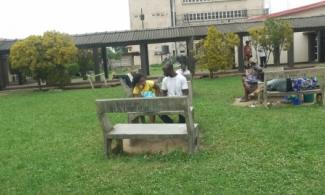
The Nigerian Medical Association (NMA) has dissociated itself from the three-day warning strike embarked upon by the National Association of Resident Doctors (NARD) on Wednesday, and expected to end on Friday.
googletag.cmd.push(function() { googletag.display('content1'); });
googletag.cmd.push(function() { googletag.display('content2'); });
The Nigerian Medical Association (NMA) has dissociated itself from the three-day warning strike embarked upon by the National Association of Resident Doctors (NARD) on Wednesday, and expected to end on Friday.
The NMA said it was embarrassed that the resident doctors had chosen to embark on a strike instead of exploring other options to resolve the crisis. The resident doctors went on the three-day warning strike after its president, Ismail Lawal, issued a directive on Monday in Abeokuta, capital of Ogun State, asking the doctors to immediately commence the strike from Wednesday.
The decision to go on strike followed the lapse of a twenty-one day ultimatum the resident doctors gave to the Federal Government. The ultimatum demanded that the government address the inadequate funding of residency training programs in the 2013 budget. The striking resident doctors said budgetary allocation for their training was extremely paltry.
A resident doctor at Lagos State University Teaching Hospital told Saharareporters that the quality of residency training has an impact on resident doctors’ handling of patients.
Echoing the residents’ concerns earlier, the President of the Nigerian Medical Association, Osahon Enabulele, criticized the poor funding of the resident doctors’ training. Dr. Enabulele urged the Federal Government to address the underfunding through a supplementary budget.
However, in a statement issued today by the NMA, Mr. Enabulele criticized the resident doctors for choosing strike over other avenues for negotiation with the government. He reminded the striking doctors of the decision they unanimously approved during their Health Summit in Asaba, January, 2013. The doctors had voted against using the instrument of strikes at the slightest provocation.
While recognizing the right of its affiliate bodies to pursue their various objectives without trepidation, the NMA warned that it would apply the strongest sanctions on any erring affiliate body or individual member that violates the association’s laws or brings the association or medical profession to public disrepute. It also warned against any blatant disregard of the association’s fundamental principles, values and mandate to protect the health of Nigerians.
The NMA apologized to the public for the inconvenience that may have arisen from the resident doctors’ strike. It however urged the government to correct the budgetary shortfall and apply all necessary administrative sanctions to any erring heads of health institutions.
Our correspondent visited Lagos State University Teaching Hospital today and observed one of the striking doctors attending only to an emergency patient. However, most resident doctors reportedly kept off duty in keeping with the strike order.
Medical doctors and other health workers in Lagos State have often been at loggerheads with government authorities over unfulfilled governmental promises. The resort to strikes has often grounded medical care at various health centers catering to millions of Lagos state residents.
Last year, a protracted strike created a crisis in the Lagos State health sector. The strike arose from the state government’s failure to implement the Consolidated Medical Salary Scale (CONMESS). In a bizarre turn in the crisis, Governor Babatunde Fashola of Lagos State announced the sacking of all 788 doctors in one fell swoop.
A disagreement between the state government and resident doctors employed by it over a reduction of the doctors’ salary package and increase in their income tax, led the doctors to strike late last year.
Meanwhile, Nigerian government officials make incessant trips abroad for medical check-ups and for other medical needs. “[The government officials] rush abroad to treat such conditions as headache and constipation, but they neglect and underfund doctors and health institutions back home,” said one of the striking resident doctors.
googletag.cmd.push(function() { googletag.display('comments'); });